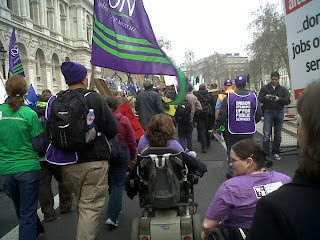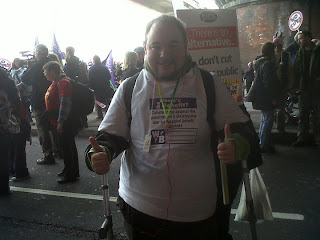Based on the
TUC's access info I'd planned to meet a bunch of other
WtBers in Savoy Street for 11am. This was supposed to be the gathering point for disabled people to have a "safe space" at the front of the march. I have brittle bones and I was with 2 people whose joints dislocate easily so the notion of a "safe" space where we wouldn't get smacked around was pretty important for us to protest, you know, safely.
Apparently no-one hit the TUC with a clue stick. The gathering point in Savoy Street wasn't actually at the front of the march. That would've been much too sensible. They had us gather in Savoy Street and then
walk through the crowd to get to the front of the march:
The pink cross on the map shows where we gathered and the turquoise line shows how far we had to walk through a sea of people to get to that "safety". Moving through large crowds as a wheelchair user is not easy at the best of times. You're at arse height to everyone else and people don't tend to look down when they move around so they walk into you, trip over you and generally leave you feeling pretty bruised. Add banners, flags and other things that feel like weapons when people hit you with them and it's even worse.
So that the TUC had us gather some distance away and then walk through the crowd where we got a bit battered was a serious common sense fail. Between the lack of logic and getting smacked around I started off the march really quite pissed off.
This was us gathering in Savoy Street looking cheerful prior to our adventure through the crowd:
This was my view of people's backs as we were making our way through the crowd:
And it's worth noting that I took this photo at a point while walking through the crowd when I had enough room around me to actually do so! I spent a lot of the time using my arms to protect my face from people's backpacks and such.
Eventually we did make it to the "special" spot:
Thankfully once we'd made it through the crowd and the march set off there were no more such access fail dramas. As a result I began to really enjoy myself. The following 3 photos were taken by Emsy during the march:
>

We made it into Hyde Park at about 1pm (after what seemed like quite a long human traffic jam at Hyde Park Corner). Most of us quickly nipped to the loo and then headed off to Soho Square for the
UK Uncut comedy at 2. I didn't want to stick around in Hyde Park for the rally mainly because Mr "I'm in favour of cutting disability benefits" Miliband was speaking. I feared my anger at him would cause me to regress a few evolutionary steps and start flinging faeces.
I've always been disabled, but until about 5 years ago I was perfectly "healthy"; I was free from illness. For many people there's a massive overlap between "illness" and "impairment", but there's also some differences too. So I've always had a rubbish skeleton but before I acquired a plethora of illnesses unrelated to my mobility impairment I used to do that working-for-a-living thing.
I used to be
a stand-up comic. Yes, I'm aware of the irony of a wheelchair-using stand-up.
On Friday evening while I was in the supermarket shopping for more T-shirts to iron the
WtB logo onto a thought occurred to me: "It's comedy against the cuts. I'm doing all this stuff about the cuts to disability benefits and I have a background in comedy; I should be speaking." So I emailed the organisers and asked if I could do a short set. The reply I got back was "the line up's pretty full, but we'll try and fit you in." But in the end (and with a little help from the lovely
Johann) I ended up on the bill.
This photo by
Chris Coltrane who compered the gig shows what the crowd looked like from where the acts were (and makes me happy that I ironed the WtB logo onto the back of my T-shirt):
That's
Josie Long performing. She opened the show. The crowd had gotten much, much, bigger by the time I went on.
This CiF piece estimates there were nearly 1000 people watching the show. I wouldn't have thought there were quite that many, but there were certainly a couple of hundred.
Against all the odds I had a brilliant gig. Look, people were smiling and laughing!

Photo by Noa Bodner
If you look you can even see
Mark Thomas laughing along in that pic. I'm actually quite proud of that as he is, basically, the industry standard to which all political comedy gets compared.
I say "against all the odds" because by rights I really should have died on my arse. It's 3 and a half years since I last gigged due to becoming too ill to carry on with the comedy thang. Usually if you take a break from comedy for 3 and a half weeks you come back to find your timing's a little off and your rhythm's a bit out. And I wasn't doing tried and tested material, I was doing stuff that I'd written 12 hours earlier because I only had the idea to ask to go on about 18 hours before I ended up on "stage". I shouldn't have been "in shape" enough to deal with a heckler and turn around a joke that was a bit of a dud. OK, the heckler was very nice and friendly but it's still an interruption to your rhythm and you need to regain control and come out on top with a laugh.
Somehow it was all OK. Sure, it wasn't my best gig ever but given everything going against me it went so much better than I could ever possibly have dreamed of.
In the past I used to mix up jokes about disability issues and other stuff because if I'd only talked about disability I'd never have been able to hold the attention of a non-disabled audience. But given that Saturday was such a political gig and the reason I'd asked to speak was to talk about benefits I did a set solely about cuts to disability benefits. The only reaction I was really expecting was some polite applause when I finished from people thinking "aw, wasn't that nice the disabled woman telling us about benefits." I wasn't expecting such a warm response and to come off stage to have all my friends hug me at once. It was like being mauled by an octopus, but in a nice way.
I've always thought that comedy had a wonderful capacity for education, another reason I really wanted to speak. So I was chuffed to bits when I got home to read this in
The Guardian's Live Blog about the day:
I just spoke to two teenagers aged 17 and 19 who have come from the comedy show in Soho Square, and they said that what they heard there made them think more than anything they have ever learnt at school. It's their first demonstration and when I asked why they came they said they realised that the demonstration is about more than just the UK.
They can understand the connection between the shops and the banks that people are targetting and the global situation that is effecting everyone. They've heard Mark Thomas and a disabled comedian and Johann Hari speak. For these teenagers the protest is absolutely opening their minds to a much wider picture.
Noa, who snapped that pic of me in action, said:
you rocked it woman, it was FUNNY and also very disturbing to learn a few of the stories you shared. many thanks and please keep healthy and get back on stage where you belong!
I'm absolutely thrilled that I opened some people's eyes to what's going on for disabled people in the UK. There's a couple of extracts from my set in the
Laugh Out London podcast.
I left Soho Square on such an adrenaline high. I'd taken a huge gamble in asking to do a set but it absolutely paid off. I would have skipped home if I could, you know, skip.
Then came the sadness. I love doing stand up so much. It's such an amazing feeling when you've got hundreds of people laughing at jokes you wrote, and Saturday was a reminder of just how thrilling it is. It's so painful that I'm not well enough to perform any more. I have good days and bad, Saturday was obviously a good day. But the sheer frequency of the bad days means that I can't book gigs more than 14 hours in advance because I can never guarantee that I'll be well enough to show up. It doesn't matter if you have a legitimate reason for not showing up to a gig, if you let a promoter down they're not going to book you again and will very possibly bad-mouth you to other promoters. I have this thing that I love doing, and Saturday reminded me that I'm actually reasonably good at it, but my health prevents me from pursuing it. And the government and tabloids really think I'd rather be stuck at home claiming benefits than out following my dreams?
The other element of sadness on Saturday night came from watching BBC News attributing the Black Bloc protesters smashing things up to UK Uncut. UK Uncut are a group of peaceful protesters who'd given me this wonderfully enjoyable afternoon of comedy in a park. And here these lovely people were being falsely accused of violence and vandalism. It was deeply disappointing.
Despite the day starting with access fail and ending in sadness I don't think I'll ever forget that chunk of a few hours in the middle where I had the best time I've had in years.
Cross-posted at Where's the Benefit?










